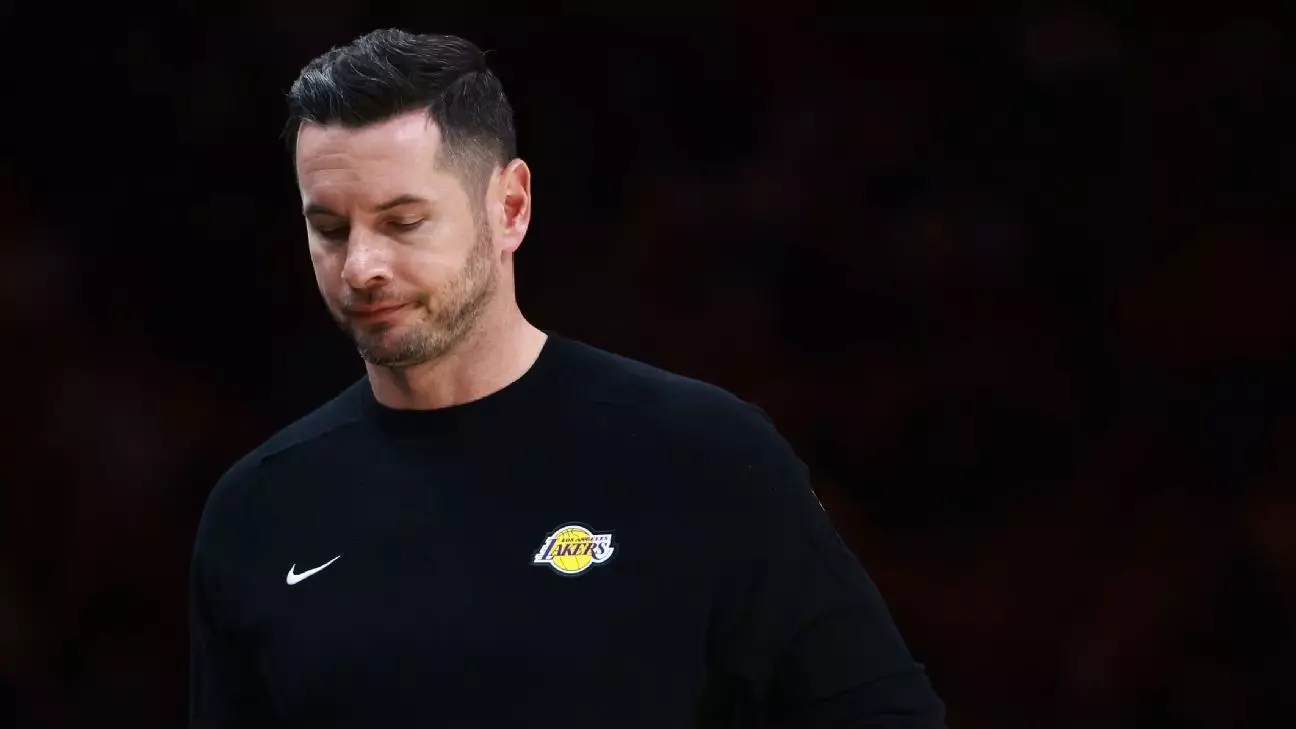The Los Angeles Lakers’ current predicament is nothing short of alarming. Following a devastating 134-93 loss to the Miami Heat, which prominently showcased Tyler Herro’s explosive performance, the team is left grappling with a series of losses that have plunged them into disarray. Having started the season with a promising 10-4 record, the Lakers have suffered six defeats in their last eight games, leading to a growing sense of confusion and frustration among players and coaching staff alike.
Head coach JJ Redick’s post-game analysis highlighted the depth of the issues plaguing the team. His remarks resonate with the reality of the situation, suggesting that the Lakers are seemingly lost, struggling to execute even basic game plans. This acknowledgment of failure is a stark contrast to the expectations set earlier in the season. The average margin of these recent defeats—21.8 points—paints a bleak picture of a team that has not just stumbled but has free-fallen from initial promise.
What complicates matters further is the duality of accountability that Redick and star player LeBron James articulated post-game. Redick openly expressed his embarrassment but also called for shared responsibility on the court. His insistence on ownership raises questions about team cohesion and communication during games. The notion that a coach can feel disconnected from the very players he leads is unsettling. It evokes images of a team that might be fractured not only in skill but in chemistry.
LeBron’s agreement with Redick’s statements brings to light a rare moment of unity in critique. His acknowledgment that the onus lies with the players rather than the coaching staff serves as both a rallying cry and an indictment of their current performance. The collective admission that they must do more is crucial; however, it begs the question of whether they can genuinely change their trajectory.
One significant area of concern is the performance of Anthony Davis. Once touted as an early-season MVP contender, Davis’s recent decline has been stark, averaging drastically low points and shooting percentages over the last few games. His self-reflection about needing to elevate his game underlines a key aspect of leadership in professional sports. When a player of his caliber grapples with his performance, it sends ripples throughout the team’s morale and effectiveness on the court.
Davis’s willingness to shoulder some of the blame suggests a mature acknowledgment of his role, but it raises an important discussion about support around him. Every player must also step up, especially when leaders falter. The Lakers seem to be caught in a cycle where underperformance breeds further uncertainty and hesitation among players, diluting the team’s overall effectiveness.
Compounding the Lakers’ struggles is the performance of their bench. In their contest against the Heat, the Los Angeles reserves were outscored 51-28, indicating a stark lack of depth and production off the bench. Gabe Vincent’s contributions—nine points and three steals—are commendable, yet insufficient in the context of a unit that has been marginalized. The evident disparity between the starters and the bench players underscores a problematic trend—the reliance on a few star players while the rest of the roster fails to make meaningful contributions.
Mood within the team has been characterized as “upset” by Vincent, a sentiment that reverberates through post-game interactions. If team morale continues to sink, the potential for recovery becomes increasingly strained. The chemistry and collaboration necessary for a successful team are fragile, and discontent can easily fracture even the most competitive of environments.
As the Lakers look ahead, their next game against a surging Atlanta Hawks team presents both a challenge and an opportunity. LeBron’s call for patience, while wise given his extensive experience, also acknowledges the urgency of results—especially after consecutive heavy losses. The experience of the older players can be a catalyst for change, yet it requires execution and resolve from every player on the roster.
The Lakers stand at a crossroads, facing a crucial juncture in their season. The combined forces of accountability, performance improvement, and rediscovering team unity will be pivotal in determining whether they can navigate out of this troubling phase. The road ahead is steep, but with introspection and action, it is a journey worth undertaking. The Lakers must draw from their storied history of resilience, determination, and excellence to alter the course of their current season.


Leave a Reply